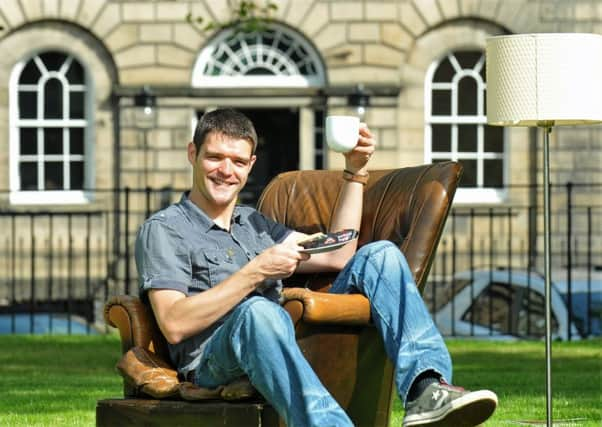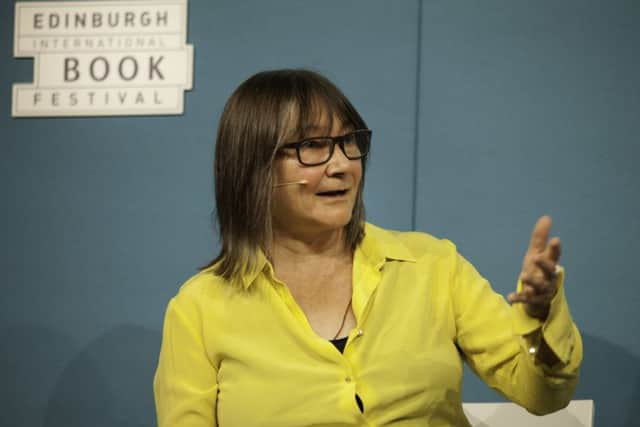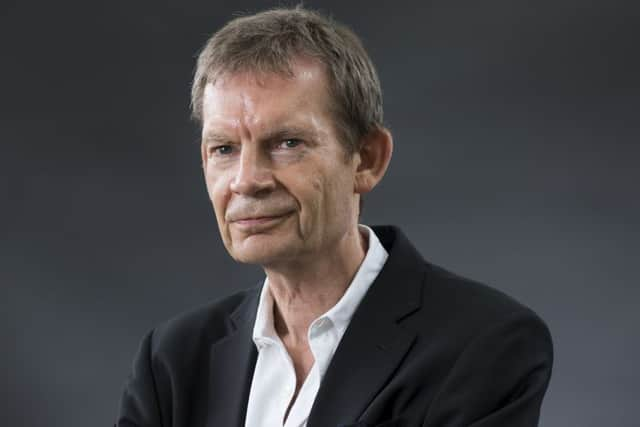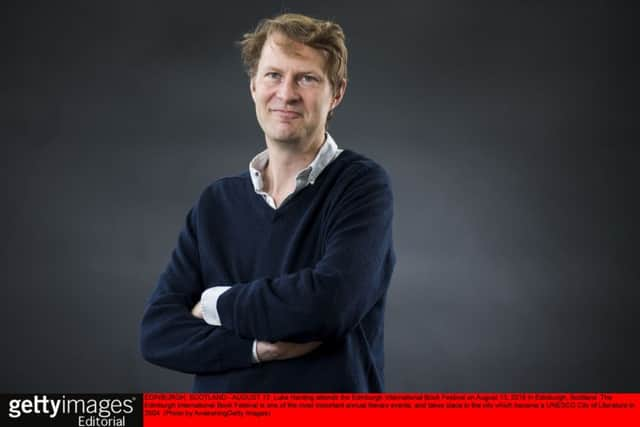Highlights from opening weekend of the Book Festival


The sound of the Africanised! choir drifted across Charlotte Square as the Book Festival opened its doors for the first day on Saturday. The sun drew the crowds out into the garden chairs, and even though it rained later on, it failed to dampen the spirits of a rich and full opening day.
It boded well that the very first event saw the Spiegeltent packed almost to capacity to hear two poets read. William Letford has followed an unusual career path, from a roofer in Stirling to a hugely acclaimed and original poet. His second collection, Dirt, takes inspiration from some of the travelling he has done since becoming a writer, but another part remains anchored in Scottish streets and Scottish voices, standing outside Greggs eating a macaroni pie, listening a to busker play.
Advertisement
Hide AdAdvertisement
Hide AdHe read with Sarah Howe, who won the prestigious T S Eliot Prize for her first collection, Loop of Jade. Her work reflects her dual heritage, from a Chinese mother and British father. She spoke of learning Chinese as an adult, noticing the word-play in its pictograms, attractive not only to poets but to bloggers and activists using them to publish online beyond China’s “Great Firewall”.


Fifteen minutes later the festival’s Main Theatre was packed to the tent-flaps with an audience who listened, rapt, to Ali Smith read from a novel so new it has only just been delivered to the publishers. Autumn is the first of four short novels themed on the seasons, which will ultimately form a single work, Seasonal.
She explained her aim is to make the books “completely contemporaneous”, as well as capturing the timeless, cyclical nature of the seasons. Autumn became more contemporary than she ever expected, when she found, as she wrote, “things were happening around me like sheep running off a cliff, speeded up”.
In the extract she read, she capture beautifully the atmosphere in the country, post-Brexit, the sense of subliminal boundaries appearing overnight. In the kind of creative step Smith makes so effortlessly, she took us from Brexit to Odysseus, washed up on a beach and relying on the hospitality of strangers: “It’s all about whether or not you welcome the stranger at the gate.”
Smith was interviewed by the recently-appointed Scots makar, Jackie Kay, a woman as warm and funny and clever as Smith herself and equally capable of heavyweight literary conversation. The word “novel”, Smith said, implies something new, something which brings insights into the “now”. She hopes her new works will “bring us to where we are, and give us distance, help us move across the divides”.


Fiction, she said, quoting Bernard MacLaverty, quoting a 12-year-old in a school writing workshop, is “made-up truth”, a phrase which echoed through the afternoon’s event with Alexander Masters, the award-winning writer of Stuart: A Life Backwards. He told the story of Stuart, a young homeless man, with all the panache of a novel, a style he applies again in his new book, A Life Discarded, takes a similar approach, inspired by 148 diaries recovered from a skip.
Fascinated by the journals which span more than 50 years, he began to piece together a sense of the anonymous writer, and found that revelation after revelation confounded his expectations. These five million hand-written words were doing a thing we rarely see: illuminating an ordinary life, its heartbreaks and disappointments and everyday obsessions, but as his detective work began to uncover his (or her) identity, he found himself facing several unexpected twists.
Advertisement
Hide AdAdvertisement
Hide AdLiterary journalist Boyd Tonkin said of Graham Swift’s fiction that “future generations should trust (the books) above headlines”. Another near sell-out crowd packed the Main Theatre to hear the Booker prizewinner talk about Mothering Sunday, his latest novel, capturing a day in the life of Jane Fairchild, a housemaid in 1924, and also describing the genesis of a writer.
One of the things the Book Festival does so well is invite world-class writers the chance to reflect on their writing lives. Swift told us how books begin with “a tingle, a flicker”, and how he feels close to all his characters, even those in books long finished. Mothering Sunday, he said, arrived unannounced, and was written with “marvellous velocity”. He also reflected on the mysterious nature of what makes a person become a writer: not a trauma, in his case, not an especially bookish childhood, an inspirational teacher or (in his words) “a particular sense of talent”, just an urge inside which he pursued.


Another great joy of the Book Festival is the way it delivers encounters with remarkable people one would never encounter otherwise. Human rights lawyer Shirin Ebadi, the first Iranian to receive the Nobel Peace Prize, is a woman with an extraordinary story. Defending the rights of activists, writers and women under the country’s strict system of Sharia law, she made some powerful enemies.
At the age of 63, in one traumatic week, she lost her job, had her possessions confiscated by Iranian security services, the offices of three of her NGOs were raided, her sister and husband arrested, and her husband threatened until he denounced her on public television. Ultimately, she was forced to leave her homeland and had to start a new life in a new country.
But the small, formidable woman we encountered on Saturday did not give up. Ebadi, who tells her story in her book, Until We Are Free, spoke with poise and determination through an interpreter, saying if she started her life again she would do nothing differently, and argued both from the basis of her legal expertise and her faith as a Muslim for a separation of state and religion in the Islamic world.
Another thing the Book Festival does so well is give a platform to figures in public life, away from the political sphere, to engage in debate and discussion. The first of these, this year, was Sir Malcolm Rifkind, a former foreign secretary and secretary of state for Scotland in the governments of Margaret Thatcher. He had a difficult job as the official representative in Scotland of the hated Thatcher regime, never more so, he said, with good humour, than when he united the fans of Rangers and Celtic against him by passing legislation to ban alcohol at football matches.


He cut a self-assured and unapologetic figure, dismissing the idea of a second independence referendum in Scotland post-Brexit, and undermining the challenges set to him by the chairwoman, Ruth Wishart. He had been surprised, he said, by the “ruthlessness” of Theresa May in orchestrating her Cabinet reshuffle, relegating several high-profile politicians to the back benches, and was sceptical of Boris Johnson’s chances as Foreign Secretary.
Advertisement
Hide AdAdvertisement
Hide Ad“On all past form, he’s unlikely to succeed. He’s no Donald Trump, he is highly intelligent, but the problem is that his reputation is built on being a celebrity, and you can’t be a celebrity and a Foreign Secretary at the same time.”
In his memoir, Power and Pragmatism, Rifkind returns to his own years at the Foreign Office, where he played an important role in bringing Mikhail and Raisa Gorbachev to London for talks with Margaret Thatcher before he was appointed Soviet premier. Here, he said, was a new type of Russian leader, and this first crucial visit to the West laid the ground for further talks, both with Thatcher and Ronald Reagan, and ultimately, a peaceful end to the Cold War.
Even as the sell-out crowd filed out from Rifkind’s event, another entirely different crowd was queuing to get in to the Main Theatre to hear poet and playwright Kate Tempest talk about her first novel, The Bricks That Built The Houses. Tempest’s poetry performance at last year’s Book Festival is still spoken of in hallowed tones for its depth and power.
Theatre director Ian Rickson, in the chair, described 30-year-old Tempest as a “literary pentathlete”, who has excelled in spoken word, music, poetry and drama, and now as a novelist. She spoke inspiringly about writing in all its forms; about Homer and William Blake and Carl Jung and the mysterious forces that make one a writer.
Like Swift, she spoke of the creative drive one follows, but cannot always explain, how much it costs, what it rewards, and what it can do in terms of holding up to the light the insanity of the world in which we live, and its beauty. She finished close to where Ali Smith began, with the inclusion of the stranger.
“I feel that we’re accelerating towards a place of such fragmentation, I hope my books leave nobody out, I hope they might even bring somebody in.”